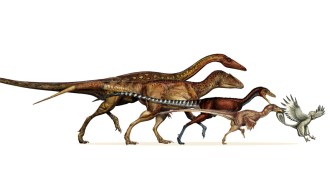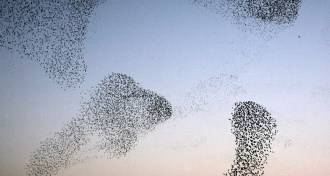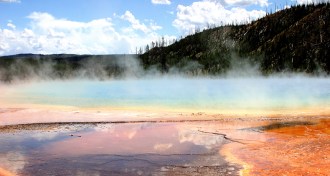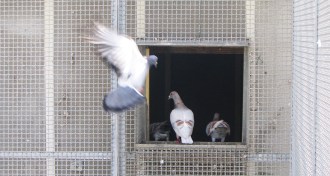News
-
 Health & Medicine
Health & MedicineResistance to key malaria drug spreads
Parasites that are less susceptible to artemisinin now affect several Asian countries.
By Nathan Seppa -
 Paleontology
PaleontologyDinosaurs shrank continually into birds
Steady miniaturization and rapidly changing skeletons transformed massive animals into today’s fliers.
By Meghan Rosen -
 Astronomy
AstronomyWhen looking for aliens, try finding their pollution
Future telescopes may discover civilized aliens by detecting the industrial pollutants called fluorinated gases in exoplanet atmospheres.
-
 Quantum Physics
Quantum PhysicsBirds’ turns match math of quantum matter
Equations that describe superfluidity may explain how information about which way and when to turn spreads in a starling flock.
-
 Earth
EarthEarly life probably fell victim to massive space rocks
Planet-sterilizing impacts probably snuffed out early life on Earth until around 4.3 billion years ago.
-
 Quantum Physics
Quantum PhysicsQuantum Cheshire Cat experiment splits particles from their properties
When facing a fork in the road, neutrons appear to go in one direction and their spins in the other.
By Andrew Grant -
 Life
LifeFor yeast life span, calorie restriction may be a wash
A new technique for growing and tracking yeast cells finds caloric restriction doesn’t lengthen life span, though some researchers question the study method.
-
 Astronomy
AstronomyTilted binary stars test theories of planet formation
Tilted disks in binary star systems may help astronomers explain variety of exoplanet orbits.
-
 Earth
EarthMerging magma can set off supervolcanoes in less than 10,000 years
The reconstruction of a massive eruption 4.5 million years ago near Yellowstone National Park suggests that magma chambers merging together beneath a supervolcano can trigger explosions in less than 10,000 years.
-
 Neuroscience
NeuroscienceHippocampus may help homing pigeons explore
When researchers remove pigeons’ hippocampi, birds fly straighter on early parts of journey home.
-
 Genetics
GeneticsGene activity change can produce cancer
Scientists have long thought that epigenetic changes, which alter gene activity, can cause cancer. Now they have demonstrated it in a mouse experiment.
-
 Health & Medicine
Health & MedicineLong-term Parkinson’s treatment sheds bad rep
Prolonged used of levodopa doesn’t increase the severity of side effects from the Parkinson’s drug, new research shows.